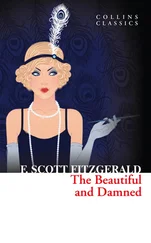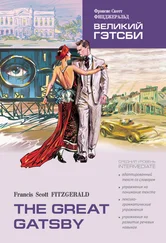Francis Fitzgerald - The Great Gatsby
Здесь есть возможность читать онлайн «Francis Fitzgerald - The Great Gatsby» — ознакомительный отрывок электронной книги совершенно бесплатно, а после прочтения отрывка купить полную версию. В некоторых случаях можно слушать аудио, скачать через торрент в формате fb2 и присутствует краткое содержание. Жанр: Классическая проза, на английском языке. Описание произведения, (предисловие) а так же отзывы посетителей доступны на портале библиотеки ЛибКат.
- Название:The Great Gatsby
- Автор:
- Жанр:
- Год:неизвестен
- ISBN:нет данных
- Рейтинг книги:5 / 5. Голосов: 1
-
Избранное:Добавить в избранное
- Отзывы:
-
Ваша оценка:
- 100
- 1
- 2
- 3
- 4
- 5
The Great Gatsby: краткое содержание, описание и аннотация
Предлагаем к чтению аннотацию, описание, краткое содержание или предисловие (зависит от того, что написал сам автор книги «The Great Gatsby»). Если вы не нашли необходимую информацию о книге — напишите в комментариях, мы постараемся отыскать её.
The Great Gatsby — читать онлайн ознакомительный отрывок
Ниже представлен текст книги, разбитый по страницам. Система сохранения места последней прочитанной страницы, позволяет с удобством читать онлайн бесплатно книгу «The Great Gatsby», без необходимости каждый раз заново искать на чём Вы остановились. Поставьте закладку, и сможете в любой момент перейти на страницу, на которой закончили чтение.
Интервал:
Закладка:
Cody was fifty years old then, a product of the Nevada silver fields, of the Yukon, of every rush for metal since seventy-five. The transactions in Montana copper that made him many times a millionaire found him physically robust but on the verge of soft-mindedness, and, suspecting this, an infinite number of women tried to separate him from his money. The none too savory ramifications by which Ella Kaye, the newspaper woman, played Madame de Maintenon to his weakness and sent him to sea in a yacht, were common knowledge to the turgid sub or suppressed journalism of 1902. He had been coasting along all too hospitable shores for five years when he turned up as James Gatz’s destiny in Little Girl Bay.
To young Gatz, resting on his oars and looking up at the railed deck, that yacht represented all the beauty and glamour in the world. I suppose he smiled at Cody—he had probably discovered that people liked him when he smiled. At any rate Cody asked him a few questions (one of them elicited the brand new name) and found that he was quick and extravagantly ambitious. A few days later he took him to Duluth and bought him a blue coat, six pairs of white duck trousers, and a yachting cap. And when the Tuolomee left for the West Indies and the Barbary Coast Gatsby left too.
He was employed in a vague personal capacity—while he remained with Cody he was in turn steward, mate, skipper, secretary, and even jailor, for Dan Cody sober knew what lavish doings Dan Cody drunk might soon be about, and he provided for such contingencies by reposing more and more trust in Gatsby. The arrangement lasted five years, during which the boat went three times around the Continent. It might have lasted indefinitely except for the fact that Ella Kaye came on board one night in Boston and a week later Dan Cody inhospitably died.
I remember the portrait of him up in Gatsby’s bedroom, a gray, florid man with a hard, empty face—the pioneer debauchee, who during one phase of American life brought back to the Eastern seaboard the savage violence of the frontier brothel and saloon. It was indirectly due to Cody that Gatsby drank so little. Sometimes in the course of gay parties women used to rub champagne into his hair; for himself he formed the habit of letting liquor alone.
And it was from Cody that he inherited money—a legacy of twenty-five thousand dollars. He didn’t get it. He never understood the legal device that was used against him, but what remained of the millions went intact to Ella Kaye. He was left with his singularly appropriate education; the vague contour of Jay Gatsby had filled out to the substantiality of a man.
He told me all this very much later, but I’ve put it down here with the idea of exploding those first wild rumors about his antecedents, which weren’t even faintly true. Moreover he told it to me at a time of confusion, when I had reached the point of believing everything and nothing about him. So I take advantage of this short halt, while Gatsby, so to speak, caught his breath, to clear this set of misconceptions away.
It was a halt, too, in my association with his affairs. For several weeks I didn’t see him or hear his voice on the phone—mostly I was in New York, trotting around with Jordan and trying to ingratiate myself with her senile aunt—but finally I went over to his house one Sunday afternoon. I hadn’t been there two minutes when somebody brought Tom Buchanan in for a drink. I was startled, naturally, but the really surprising thing was that it hadn’t happened before.
They were a party of three on horseback—Tom and a man named Sloane and a pretty woman in a brown riding-habit, who had been there previously.
“I’m delighted to see you,” said Gatsby, standing on his porch. “I’m delighted that you dropped in.”
As though they cared!
“Sit right down. Have a cigarette or a cigar.” He walked around the room quickly, ringing bells. “I’ll have something to drink for you in just a minute.”
He was profoundly affected by the fact that Tom was there. But he would be uneasy anyhow until he had given them something, realizing in a vague way that that was all they came for. Mr. Sloane wanted nothing. A lemonade? No thanks. A little champagne? Nothing at all, thanks. … I’m sorry—
“Did you have a nice ride?”
“Very good roads around here.”
“I suppose the automobiles—”
“Yeah.”
Moved by an irresistible impulse, Gatsby turned to Tom, who had accepted the introduction as a stranger.
“I believe we’ve met somewhere before, Mr. Buchanan.”
“Oh, yes,” said Tom, gruffly polite, but obviously not remembering. “So we did. I remember very well.”
“About two weeks ago.”
“That’s right. You were with Nick here.”
“I know your wife,” continued Gatsby, almost aggressively.
“That so?”
Tom turned to me.
“You live near here, Nick?”
“Next door.”
“That so?”
Mr. Sloane didn’t enter into the conversation, but lounged back haughtily in his chair; the woman said nothing either—until unexpectedly, after two highballs, she became cordial.
“We’ll all come over to your next party, Mr. Gatsby,” she suggested. “What do you say?”
“Certainly; I’d be delighted to have you.”
“Be ver’nice,” said Mr. Sloane, without gratitude. “Well—think ought to be starting home.”
“Please don’t hurry,” Gatsby urged them. He had control of himself now, and he wanted to see more of Tom. “Why don’t you—why don’t you stay for supper? I wouldn’t be surprised if some other people dropped in from New York.”
“You come to supper with me, ” said the lady enthusiastically. “Both of you.”
This included me. Mr. Sloane got to his feet.
“Come along,” he said—but to her only.
“I mean it,” she insisted. “I’d love to have you. Lots of room.”
Gatsby looked at me questioningly. He wanted to go, and he didn’t see that Mr. Sloane had determined he shouldn’t.
“I’m afraid I won’t be able to,” I said.
“Well, you come,” she urged, concentrating on Gatsby.
Mr. Sloane murmured something close to her ear.
“We won’t be late if we start now,” she insisted aloud.
“I haven’t got a horse,” said Gatsby. “I used to ride in the army, but I’ve never bought a horse. I’ll have to follow you in my car. Excuse me for just a minute.”
The rest of us walked out on the porch, where Sloane and the lady began an impassioned conversation aside.
“My God, I believe the man’s coming,” said Tom. “Doesn’t he know she doesn’t want him?”
“She says she does want him.”
“She has a big dinner party and he won’t know a soul there.” He frowned. “I wonder where in the devil he met Daisy. By God, I may be old-fashioned in my ideas, but women run around too much these days to suit me. They meet all kinds of crazy fish.”
Suddenly Mr. Sloane and the lady walked down the steps and mounted their horses.
“Come on,” said Mr. Sloane to Tom, “we’re late. We’ve got to go.” And then to me: “Tell him we couldn’t wait, will you?”
Tom and I shook hands, the rest of us exchanged a cool nod, and they trotted quickly down the drive, disappearing under the August foliage just as Gatsby, with hat and light overcoat in hand, came out the front door.
Tom was evidently perturbed at Daisy’s running around alone, for on the following Saturday night he came with her to Gatsby’s party. Perhaps his presence gave the evening its peculiar quality of oppressiveness—it stands out in my memory from Gatsby’s other parties that summer. There were the same people, or at least the same sort of people, the same profusion of champagne, the same many-colored, many-keyed commotion, but I felt an unpleasantness in the air, a pervading harshness that hadn’t been there before. Or perhaps I had merely grown used to it, grown to accept West Egg as a world complete in itself, with its own standards and its own great figures, second to nothing because it had no consciousness of being so, and now I was looking at it again, through Daisy’s eyes. It is invariably saddening to look through new eyes at things upon which you have expended your own powers of adjustment.
Читать дальшеИнтервал:
Закладка:
Похожие книги на «The Great Gatsby»
Представляем Вашему вниманию похожие книги на «The Great Gatsby» списком для выбора. Мы отобрали схожую по названию и смыслу литературу в надежде предоставить читателям больше вариантов отыскать новые, интересные, ещё непрочитанные произведения.
Обсуждение, отзывы о книге «The Great Gatsby» и просто собственные мнения читателей. Оставьте ваши комментарии, напишите, что Вы думаете о произведении, его смысле или главных героях. Укажите что конкретно понравилось, а что нет, и почему Вы так считаете.












